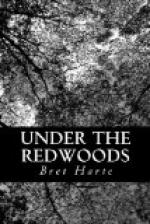Meantime the two outcasts returned to their island camp. It may have occurred to them that a little of the sunlight had gone from it with Bob; for they were in a dull, stupid way fascinated by the little white tyrant who had broken bread with them. He had been delightfully selfish and frankly brutal to them, as only a schoolboy could be, with the addition of the consciousness of his superior race. Yet they each longed for his return, although he was seldom mentioned in their scanty conversation—carried on in monosyllables, each in his own language, or with some common English word, or more often restricted solely to signs. By a delicate flattery, when they did speak of him it was in what they considered to be his own language.
“Boston boy, plenty like catchee him,” Jim would say, pointing to a distant swan. Or Li Tee, hunting a striped water snake from the reeds, would utter stolidly, “Melikan boy no likee snake.” Yet the next two days brought some trouble and physical discomfort to them. Bob had consumed, or wasted, all their provisions—and, still more unfortunately, his righteous visit, his gun, and his superabundant animal spirits had frightened away the game, which their habitual quiet and taciturnity had beguiled into trustfulness. They were half starved, but they did not blame him. It would come all right when he returned. They counted the days, Jim with secret notches on the long pole, Li Tee with a string of copper “cash” he always kept with him. The eventful day came at last,—a warm autumn day, patched with inland fog like blue smoke and smooth, tranquil, open surfaces of wood and sea; but to their waiting, confident eyes the boy came not out of either. They kept a stolid silence all that day until night fell, when Jim said, “Mebbe Boston boy go dead.” Li Tee nodded. It did not seem possible to these two heathens that anything else could prevent the Christian child from keeping his word.
After that, by the aid of the canoe, they went much on the marsh, hunting apart, but often meeting on the trail which Bob had taken, with grunts of mutual surprise. These suppressed feelings, never made known by word or gesture, at last must have found vicarious outlet in the taciturn dog, who so far forgot his usual discretion as to once or twice seat himself on the water’s edge and indulge in a fit of howling. It had been a custom of Jim’s on certain days to retire to some secluded place, where, folded in his blanket, with his back against a tree, he remained motionless for hours. In the settlement this had been usually referred to the after effects of drink, known as the “horrors,” but Jim had explained it by saying it was “when his heart was bad.” And now it seemed, by these gloomy abstractions, that “his heart was bad” very often. And then the long withheld rains came one night on the wings of a fierce southwester, beating down their frail lodge and scattering it abroad, quenching their camp-fire, and rolling up the bay until it invaded




